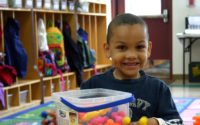Early Childhood Care and Education: how can you practically imply it?
Early childhood education is meant for children in the age group of 3 to 5 years i.e. just before they cross the threshold of elementary school. This education enables them to stay ahead of others even when they continue to gather elementary education.
The targeted age group of early childhood care and education is important because they attain the most percentage of brain development, approximately 90%, during these years. The education they receive forms the base for the future developmental process. This is why ECE is gradually becoming popular and sought after by the parents of children.
There are some practical implications of ECE that you should know about. Social and emotional learning or SEL is one of them. Here we bring to you things you may want to know about this and assuredly, you will find ECE more interesting.
SEL: what is it?
Social and Emotional Learning is comparatively new dimension in the world of child education. While the education environment has only lately realised its importance, in terms of skill accumulation, SEL is second to none.
What skills are included? The transferable social and emotional skills that a child can utilise to control feelings and handle emotions- those are the SEL skills. A child may be placed in a social situation that she or he is unfamiliar with or one that is diverse. This is where the skills will come in handy for them.
- The specific skills include:
- Understanding a wide range of emotions
- Managing a diverse array of emotions
- Developing and maintaining healthy relationships
- Making decisions that will be socially sound and acceptable
Characteristics of SEL programme: what to look out for?
SEL programmes are designed in a certain way so that the development of a child is wholesome. There are certain features you should concentrate upon when choosing an SEL programme. A few of the most important characteristics include:
- Learning activities that are connected to skill development in a corresponsive way
- Various forms of learning process to facilitate active learning
- Precise skill direction
- Scope for social skill development
- Reliability of the programme
- Emphasis on maintaining quality of the programme
What does SEL aim at?
SEL aims at resolving learning issues. Now, learning issue can be an umbrella term and may include lack of communication to development of disorders that hinder the learning process. For example, poverty refrains a good number of children from accessing basic education.
SEL tries to reach these children by providing them with positive interactive environment for learning. With SEL becoming increasingly known, it is helping in shaping the future of children with assistance readily.
Implementing a test culture that is universally accepted is yet another issue that SEL tries to solve and incorporate strategies to make the process fully effective. Here again, the programme faces communication challenges.
How to include SEL skills in a regular class?
In a regular class you will find children of various social and economical backgrounds coming together for the sole purpose of learning. It is thus now quite easier for acquiring social and emotional skills in a diverse and multilingual classroom.
If you are a degree holder in the relevant field and have undergone online teacher training course, you should now emphasise on developing a productive learning environment. Give the students situations or scopes, even if you have to simulate it, where they can hone their social and emotional skills.
Lessons you teach must be unambiguous and have hidden or open message of social and emotional skills. Keep track of how the children react to different situations and identify if they are using the skills they learnt appropriately.
You do not have to plan a different lesson for SEL. You can incorporate the same in social studies, mathematics, English literature or other subjects as you find convenient. It is the skill development that is important, not the subject they learn it from.
That’s pretty much how ECCE finds its practical implication through the implementation of SEL. Join a recognised and properly affiliated course today if you feel you want to make children ready for tomorrow, especially from social and emotional aspect. Do your research today!
Image Source: Freepik.com


